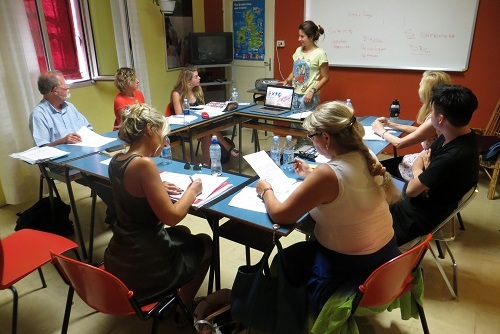Stepping outside your comfort zone in a new culture and a new role means you’re leaving the world you know and entering the unknown.
But good news- that’s where adventure, growth, and life changing experiences happen!
Below are some pieces of advice to make your transition as a first time teacher abroad as easy as possible.
1. Plan a Few Lessons or Activities
Planning a few lesson outlines or ice breaker games before you leave will help you feel more ready. You’ll feel more confident when school starts if you have a plan in hand. Before you leave, brainstorm a few lesson topics or search online for sample ideas for your age group.
If your teaching experience is as an assistant and not the main teacher, you may not end up using the lesson. That’s okay! It still served a purpose helping you feel more prepared.
2. Know that Students May be Shy at First
Students around the world tend to be a bit shy in front of a new teacher. They often sit back and observe, trying to evaluate whether the teacher will be strict, a pushover, etc.
Since you’re a foreigner, they may take longer before feeling comfortable answer questions out loud. Remember, you’re a native speaker and they’re new to the language.
They may feel worried about making mistakes in front of you and being embarrassed in front of their peers. A lack of student engagement doesn’t necessarily mean you’re doing a poor job. Your students just may need time to warm up and feel comfortable around their newcomer teacher.
Keep in mind also that some cultures don’t encourage verbal commentary and engagement from students, preferring students only speak up if they’re confused.
3. Know That You Will Make Mistakes
It’s great to go abroad enthusiastic about doing well as a teacher. But it’s your first time-and no one is perfect their first time (or their third or fifth for that matter).
Making mistakes is part of the process. You’ll have good days...and not so good days. Some lessons you’ll speak too quickly. Some days you may bore your students.
Sometimes you may confuse them with your instructions. That’s okay! You’re learning how to teach, and that takes time. Don’t internalize your mistakes. Instead, acknowledge what went wrong, make a note of how to do things different next time, and then let it go.
4. Learn As Much As You Can About the Culture
The more you know about the culture, the better experience you will have.
Research the local customs, values, and lifestyle. You’ll be better equipped to recognize cultural differences and adapt. Some cultures for example, place a hierarchy between those in a position of power (like a teacher) and those underneath them (like a student).
If you enter this culture sitting casually on the desk and joking around with students, it may be seen as inappropriate and undermining your authority. Or maybe the culture places a large value on appearance, so showing up with jeans and a t-shirt would be out of the question.
5. Remember the School Will be Different than School at Your Home Culture
Because you’re in a new culture, the way schools run will be different. Classrooms may only have chalkboards. Breaks in the day may not be the norm. Students and staff may talk more freely or less freely about their personal lives than you’re used to.
Classes may start promptly at the scheduled time, or start whenever the teacher happens to arrive. These differences may cause you stress at first, but rest assured you will adapt soon.
Try hard not to evaluate these differences as “bad” or “worse than your home culture”. Instead, acknowledge them for being a neutral “different”.
6. Go Into The Experience With An Open Mind
It can be easy to build up this experience in your mind with unrealistic expectations that end up not being met. Maybe you hope to be your students’ favorite teacher, and some students just don’t like you. Maybe you’re experienced with teaching at home and expect it to be an easy transition abroad, and you struggle.
It’s difficult when we expect one thing and experience another. Trying to limit your expectations will help prevent disappointment or frustration when things go differently. Look at the big picture and focus on having an engaging, enjoyable, and enriching experience.
Whatever experience you’ll have, it will be a meaningful one.
7. Go Easy On Yourself
Try to avoid putting too much pressure on yourself. You’re new at this, and no one expects you to be at a professional level at the start. Give yourself time to adapt to the new culture and new role as an English teacher.
Each day it will get easier. Before you know it, you’ll feel like a natural. But until that happens, be patient with yourself during your learning process. And remember to have fun!
By Madison Garner
Related Pages























